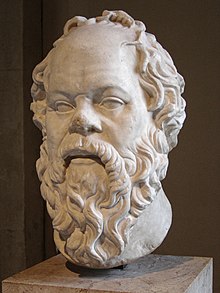
Back Syllogismus ALS قياس (منطق) Arabic Sillogizm Azerbaijani Силогизъм Bulgarian Sullogismos Breton Sil·logisme Catalan قیاس CKB Sylogismus Czech Syllogisme Danish Syllogismus German
This article has multiple issues. Please help improve it or discuss these issues on the talk page. (Learn how and when to remove these messages)
|
A syllogism (Ancient Greek: συλλογισμός, syllogismos, 'conclusion, inference') is a kind of logical argument that applies deductive reasoning to arrive at a conclusion based on two propositions that are asserted or assumed to be true.

In its earliest form (defined by Aristotle in his 350 BC book Prior Analytics), a deductive syllogism arises when two true premises (propositions or statements) validly imply a conclusion, or the main point that the argument aims to get across.[1] For example, knowing that all men are mortal (major premise), and that Socrates is a man (minor premise), we may validly conclude that Socrates is mortal. Syllogistic arguments are usually represented in a three-line form:
All men are mortal.
Socrates is a man.
Therefore, Socrates is mortal.[2]
In antiquity, two rival syllogistic theories existed: Aristotelian syllogism and Stoic syllogism.[3] From the Middle Ages onwards, categorical syllogism and syllogism were usually used interchangeably. This article is concerned only with this historical use. The syllogism was at the core of historical deductive reasoning, whereby facts are determined by combining existing statements, in contrast to inductive reasoning, in which facts are predicted by repeated observations.
Within some academic contexts, syllogism has been superseded by first-order predicate logic following the work of Gottlob Frege, in particular his Begriffsschrift (Concept Script; 1879). Syllogism, being a method of valid logical reasoning, will always be useful in most circumstances, and for general-audience introductions to logic and clear-thinking.[4][5]
- ^ Lundberg, Christian (2018). The Essential Guide to Rhetoric. Bedford/St.Martin's. p. 38.
- ^ John Stuart Mill, A System of Logic, Ratiocinative and Inductive, Being a Connected View of the Principles of Evidence, and the Methods of Scientific Investigation, 3rd ed., vol. 1, chap. 2 (London: John W. Parker, 1851), 190.
- ^ Cite error: The named reference
:0was invoked but never defined (see the help page). - ^ Hurley, Patrick J. 2011. A Concise Introduction to Logic. Cengage Learning. ISBN 9780840034175
- ^ Zegarelli, Mark. 2010. Logic for Dummies. John Wiley & Sons. ISBN 9781118053072.